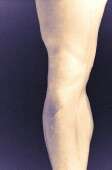(HealthDay) -- After at least 10 years of follow-up, total knee replacement using a second-generation, cemented, rotating-platform, posterior-stabilized total knee prosthesis offers excellent and durable clinical and radiologic results in active patients, according to a study published in the April 4 issue of The Journal of Bone & Joint Surgery.
Jean-Noel A. Argenson, M.D., of the Aix-Marseille University in France, and colleagues conducted a studying involving 116 consecutive rotating platform total knee arthroplasty procedures performed in 112 patients with osteoarthritis and other disorders using the LPS-Flex Mobile cemented prosthesis.
During an average follow-up of 10.6 years, the researchers noted one revision due to infection and one because of failure of the medial collateral ligament. The implant survival rate at 10 years was 98.3 percent. In 104 patients (108 knees) assessed at a minimum of 10 years, there was an improvement in the average Knee Society knee scores (from 34 to 94 points) and function scores (from 55 to 88 points). Periprosthetic osteolysis and implant loosening were not observed on follow-up radiographs. Knee flexion improved from 117 degrees preoperatively to 128 degrees at follow-up, with quality of life, assessed using the Knee Injury and Osteoarthritis Outcome Score, significantly better for patients with flexion >125 degrees.
"With the durable clinical and radiographic results demonstrated in this series and the functional outcome obtained in terms of knee flexion and knee-related quality of life, we believe that this high-flexion, mobile-bearing design is a valid option for our current active patients undergoing total knee arthroplasty," the authors conclude.
One or more authors disclosed a financial relationship with an entity in the biomedical arena.
More information:
Abstract
Full Text (subscription or payment may be required)
Copyright © 2012 HealthDay. All rights reserved.


















